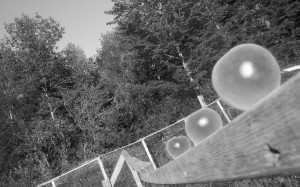Everyday life, especially in this little school atop the hill, is studded with calendars filled with opportunities to snatch so as “not to miss anything.” How easily the mind slips into high gear, filling up space in the planner so as to experience it all! This time of year is marked by the harvesting of activities and involvements. In the sighs of the wind and heat, weary prairie grasses, soybean fields and the blushing tones of tomatoes remind us that the fields are ripe for harvest now and are slowly approaching the blessed season of rest.
“The best and most beautiful things in the world cannot be seen or even touched. They must be felt with the heart.” Great thanks to Helen Keller for these words of inspiration (and thank you to the gal or fellow who designed a mug with these words on it, that I may happily sip tea out of a cuppa wisdom).

Keller patiently worked with Anne Sullivan to learn to communicate despite intimidating limitations. To peel back the habits of analytical scrutiny reveals the juicy fruit of emotion. Keller insists upon the validity, and indeed, vitality, of this shedding.
Just as the farmer collects a basket of tomatoes for the meal, so do each of us select life-giving ingredients for our lives. Does each of those ingredients earn its place in our lives? What does simplicity look like amidst a whirl of possibilities and hopeful sign-up sheets?
Recently while traveling, I met a woman I’ll call Betsy. Colorfully and joyfully clad in her traveling dress and suitcase, I first saw her nestled amongst her bags and snacks in an American airport. Hearing the punctuated and familiar speech of an old movie playing nearby, I glanced at the screen she was watching. It was the 1962 version of The Miracle Worker. Both of us drawn from the blaring lights and wafting scents of the airport’s entertainment corridor, Betsy and I got to know each other in front of this black and white tale of patience and love.
After we connected a bit, Betsy told me one of the reasons she had for hope that day. A bullet had grazed a young nephew of hers, and he had just barely survived the incident. His neck was injured, but not fatally. Distraught family members gathered together to support the invalid. It was all too coincidental that Betsy and her family were already in town visiting each other when this accident happened. How beautiful and messy it was that in a time of need, all were there to support each other. The number of well-intentioned family members rivaled that of an overzealous zucchini patch, overwhelming the recovering nephew and even each other in the small space.
Betsy reflected on the spontaneity of it all, the timing of the visit, the random injury and above all, the strong and overwhelming sense of calm and peace she experienced. She felt love in that space and time, solid and sure. Betsy’s witness to believing in the hope present in every moment reminds me of the works of Saint Theophan the Recluse, who writes, “You must descend from your head into your heart.” This call to simplify also implies an intensification of life. Life should consist of quality over quantity.
As opportunities grow exponentially and color coded calendars plaster doom rooms, I’m reminded of Betsy’s story. She found peace in an unlikely place—in the chaos of hate and the blurry sight of tragedy. As the urge to fill up our lives with involvements and good intentions continues, let us remember what we are already given. What gifts have you received that allow you to enjoy life? Keller’s words remind us to be open to the goodness of life, and to dare to feel it. As we use our minds to guard and nourish knowledge, to cultivate and share wisdom, may our hearts also be open to the blessings at present.